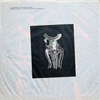 This 1986 album was the beginning of Zoviet France’s Charm, Ceremony, Chance, Prophecy tetralogy and continued the collective's shift away from harsher textures and lo-fi production towards a cleaner and more restrained aesthetic.  Misfits occupies something of a lull in the Zoviet France discography, as it is not nearly as strong as earlier releases like Eostre, Gris, or Norsch nor does it give much hint of how much potential such a change in direction actually held.  Despite that, it still boasts a few excellent pieces, one of which ranks among the band’s finest work.
This 1986 album was the beginning of Zoviet France’s Charm, Ceremony, Chance, Prophecy tetralogy and continued the collective's shift away from harsher textures and lo-fi production towards a cleaner and more restrained aesthetic.  Misfits occupies something of a lull in the Zoviet France discography, as it is not nearly as strong as earlier releases like Eostre, Gris, or Norsch nor does it give much hint of how much potential such a change in direction actually held.  Despite that, it still boasts a few excellent pieces, one of which ranks among the band’s finest work.
Red Rhino/Charrm
Sadly, I was not cool enough at age 11 to have picked this up when it came out, but if I had, I would have been a bit confused as to what Zoviet France was going for. Given the benefit of hindsight, it is a logical stage in their evolution, but when compared to only its predecessors, it seems a bit like ZF lost the plot a bit. Misfits, Looney Tunes, and Squalid Criminals is a comparatively tame and minimal affair and there is quite a bit of filler included for just a nine-song album.  Most of these pieces suffer from a lack of intensity, density, or progression, all of which were ineffectually replaced by an unwavering faith in the powers of clarity, space, and adding lots of echo to percussion loops.  History has proven that their instincts were ultimately mostly right, but at this stage of the game, the collective had not quite gotten all pieces quite in place for a successful "ambient" album.
A couple of the longer pieces sound pretty dated and unrewarding today, like "Host-Blowing the Instrument,""Flote," and "Rattle Stick Cruss," as they have very little substance beyond very simple ethno-percussion loops being reversed or heavily echoed.  In fact, they kind of sound like Jamaican dub with all of the song-like aspects removed: no real melody, no strong beat, just plenty of reverb- and echo-heavy clattering and maybe an occasional didgeridoo or ghostly melodica.  Also, the few slightly harsher "old style" pieces, like "Signal 2" and "Signal 3" sabotage their effective use of garbled vocals and ominous tension by being extremely short.  It feels like the band was being pulled in two separate, opposing directions and didn't realize that there was quite a bit of more welcoming musical terrain available between them. However, things get quite a bit better by the end of the album.
The brief but hypnotically pulsing "Gesture, Signal, Threat" is the album's first clear moment of success, though it perhaps errs in being a bit too aggressive with reversed tape loops.  "Semasen," however, tackles roughly the same territory, but works dramatically better, adding a cool, blurred-sounding bass line and a warm, drugged haze.  Equally importantly, it is given some time to stretch out and achieve a healthy degree of cumulative power.  It almost seems like Zoviet France had an epiphany near the end of the recording session in which they realized that striving for minimalism and nuance doesn't necessarily mean that songs have to be limited to just one or two ideas.  Whether such a realization actually occurred is anybody's guess, but the album's closing piece pulls all the threads together in way that makes sense and towers above everything that preceded it.
The provocatively titled "They're Eating the Passengers" is a minor masterpiece of sinister tension, weaving echo-warped tapes of plane hijackers with an insistent pulsing and brooding smears from an Eastern-sounding string instrument.  There's still a heavy reliance on studio effects and repetition, but in this instance they are used in service of a very strong musical idea rather than as ends unto themselves.  Also, it helps that the sarod or tanpura (or whatever the hell it is) is used melodically as well as texturally.  I'm actually a bit mystified as to why such an excellent piece wound up being released at the end of a lackluster album rather than being used as the cornerstone of a newer, better album, but I imagine they had their reasons.
Anyone attempting to compile a retrospective of Zoviet France's work would be a bit crazy not to include "Passengers" and possibly "Semasen," but Misfits, Looney Tunes, and Squalid Criminals’ appeal effectively ends there (unless you can find a fully intact copy of the record, since the album art is pretty neat too). Fortunately, this stage turned out to be just an awkward transition rather than the beginning of Zoviet France's demise, as some of their greatest work was still to come.
Samples:
 
 
 
Read More

